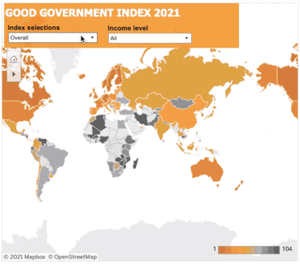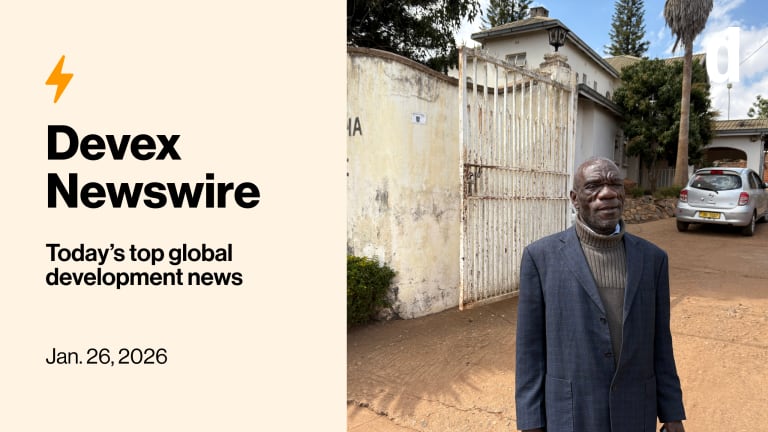
This is a preview of our daily Newswire. Sign up to this newsletter to receive an inside look at the biggest stories in global development.
The cost of wheat has doubled during Yemen’s civil war. Why is food so expensive in one of the world’s worst-off countries?
Nearly 50,000 people in Yemen are already experiencing famine, and 16 million are food insecure. The country has been at war since 2015, and relief agencies are struggling to find enough donor funding to stave off widespread famine. A big part of the problem is transportation costs, Teresa Welsh reports.
• Yemen imports 90% of its food, and transport costs account for 50% of food prices. Job losses and salary cuts make it unaffordable for many.
• Regulations that require cargo shipments to be inspected in another country prior to arrival, plus war insurance risk premiums, can make it 16 times more expensive to ship to Yemen than to neighboring Oman.
• Ships can spend more than two weeks anchored outside the Port of Aden before entering, and then 10 days at berth while cargo is unloaded. Then they leave empty because Yemen doesn’t have any goods to export.
Teresa spoke to UNDP Yemen’s Auke Lootsma, who described efforts underway to improve the country’s ports to help decrease costs and thus reduce high food prices.
Read: Staving off famine in Yemen requires urgent port overhaul, UNDP says
DEEP CUTS
U.K. funding to the Global Polio Eradication Initiative has been cut by 95% — from £100 million ($139 million) expected this year to just £5 million, Will Worley discovered. U.K. aid spending has been particularly important to polio eradication efforts because it’s been unrestricted, allowing GPEI to spend it wherever it can do the most good at any given time, according to dismayed campaigners — one of whom described the cut as “catastrophic.”
Read: Exclusive: UK cuts polio funding by 95%
LEADERSHIP MATTERS

The 2021 Chandler good government index — launched this week — ranks 104 countries across seven indicators of governance, with Finland at the top of the heap and Venezuela dead last. Lisa Cornish speaks to the Chandler Institute’s director about the challenges of measuring good governance, and why doing so can improve country outcomes across income levels.
Devex Pro: Ranking good government: Does it apply to LMICs?
TRIALS AND TRIBULATIONS
With COVID-19 herd immunity still a distant prospect across African countries, researchers are hoping to develop new treatments that can prevent mild-to-moderate cases from turning critical, Sara Jerving reports.
• The Drugs for Neglected Diseases initiative is currently recruiting participants for Africa’s largest clinical trial of treatments for early-stage COVID-19.
• The ANTICOV study includes a consortium of 26 African and global research and development organizations and will take place in 13 African countries.
• Health experts say treatments that prevent severe illness are particularly important for countries with weaker health systems, because they can help limit the number of patients requiring critical care.
Read: Africa's largest clinical trial for early-stage COVID-19 drugs launches
OUNCE OF PREVENTION
Humanitarian organizations including OCHA, WFP, and FAO are turning to scientific forecasts to predict drought, flooding and other extreme weather events. But does it make financial sense to intervene in advance? What if the disaster never arrives? Amy Lieberman reports.
Read: Early humanitarian action can save lives, money. But it comes with uncertainty.
And speaking of anticipation, Lois Quam and Murtala Mai of Pathfinder International write that the world should start fighting the next pandemic now — by focusing on preventing problems rather than fixing them. Still, a WHO draft document calling for the creation of a working group to strengthen preparedness appears to be held up by China, Russia, Syria, and Pakistan protesting references to COVID-19’s origins and to human rights.
WHERE’S THE BEEF?
A civil society coalition has rejected new guidelines from the U.N. Committee on World Food Security as so tainted by corporate influence as to represent a step back in how food systems should tackle malnutrition and meet the SDGs. It has concerns about the upcoming U.N. Food Systems Summit too, Teresa reports.
Read: Civil society rejects UN Council on World Food Security's new voluntary guidelines
IN OTHER NEWS
An estimated 29 million people across the Sahel are in need of humanitarian assistance due to unrest in the region. [Al Jazeera]
Aid for water and sanitation projects will be cut by more than 80%, a leaked U.K. FCDO memo shows. [BBC]
The U.S. State Department has ordered a pullout of non-essential staff from its Afghanistan embassy amid heightened security concerns as troop withdrawal looms. [NPR]
Sign up to Newswire for an inside look at the biggest stories in global development.








